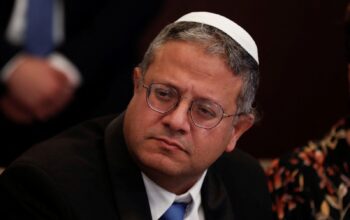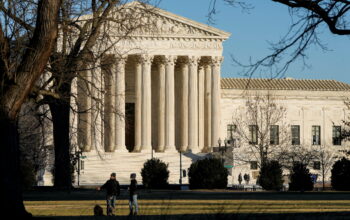Some residents set off fireworks against anti-overhaul demonstrators; others greet them with food, water; cops shove ex-police minister Omer Barlev at Petah Tikva protest
Demonstrations against the government’s judicial overhaul continued on Thursday night, with thousands attending a controversial march through the ultra-Orthodox city of Bnei Brak, near Tel Aviv.
Carrying a giant mock-up of the Declaration of Independence, protesters against the government’s judicial overhaul plan chanted, blew horns and blocked major roads as they made their way through the Haredi enclave.
The event had faced criticism ahead of time, with some on the right accusing protesters of vilifying and harassing citizens who are not involved in the legislation, while even some protest backers said it was in bad taste.
Still, organizers pressed on, saying they had not come to attack Haredi residents but to make clear to them that they, and their public representatives, can not stand aside and allow the radical shakeup of the justice system and its consequences pass.
Some local residents fired fireworks at demonstrators, but no injuries were reported.
Others handed out bottles of water and food to both protesters and counter-demonstrators, in an attempt to foster a positive atmosphere.
Counter-protests included ad-hoc groups of locals, a banner welcoming “Tel Avivians” to Bnei Brak, and a Chabad “mobile unit for spreading Judaism,” complete with loudspeakers blasting religious-themed music.
According to the Maariv daily, two anti-government protesters were arrested.
In the central city of Petah Tikva, protesters broke through barriers outside a hotel where Religious Zionism’s Bezalel Smotrich and MK Simcha Rothman, one of the architects of the government’s legislation, were attending an event.
Policemen scuffled with protesters, and some were seen pushing former public security minister Omer Barlev, who until a few months ago was in charge of their activities.
Protesters also blocked Begin Road in Tel Aviv heading south but were cleared away by mounted police and water cannons.
Meanwhile, dozens of protesters from the Standing Together social justice movement held an alternative rally in Tel Aviv at Dizengoff Square.
The movement said in a statement that its struggle is “against the policies of the government, and not against the public. The demonstration against Haredi residents of Bnei Brak is invalid and wrong, because it pits people against people, instead of the people against the government,” it said.
The demonstrations came at the tail end of nationwide protests against the government’s proposals, dubbed a “day of paralysis.” Police arrested at least 92 people across the country, and deployed horses and water cannons to clear demonstrators blocking roads in Tel Aviv and Haifa.
In a statement Thursday evening, Prime Minister Benjamin Netanyahu vowed to get involved in the judicial overhaul despite a conflict of interest agreement that bars him from doing so due to his ongoing criminal trial.
While he promised to take the opposition’s concerns into account and seek to balance the legislation, he also said the government will press ahead with the bill to assert control over the panel that chooses judges — saying it will pass in its present form in the Knesset next week.
In the lead-up to the Bnei Brak march, President Isaac Herzog called for restraint among protesters. The statement said the president met with several officials over the past day, including Bnei Brak’s mayor, law enforcement, elected officials, protest organizers, and community and religious leaders, in order to “prevent violence and lower the flames as much as possible.”
Netanyahu also issued a call for the Haredi community not to confront the anti-government protest in Bnei Brak.
Amid fears of escalated violence in Bnei Brak, protester organizers distributed construction helmets to some participants.
“They’re in case they throw stuff at us… like eggs, stones,” said Roni Golan, 63.
Golan made the short trip from Tel Aviv to protest against the government’s judicial plans, but also to send a message about what he described as grievances against Haredi citizens.
He said he came to Bnei Brak “to explain to the religious that their leadership is keeping them poor, keeping them from being educated to join the workforce.”
Haredi leaders last summer cut a deal with Netanyahu to increase funding to their separate education system without adding core secular subjects required for workforce integration, such as English, math and science.
Despite several rabbis asking youth to refrain from entering protest zones, several Haredi youths gathered on the fringes of the march.
Avraham, 16, said that despite not being versed in the technical details of the judicial overhaul debate, he came to counter-protest as part of a social statement.
“I don’t understand the reform, I just know they came here because they’re against us,” he said, pointing at the abutting mass of hundreds of protesters.
“One of them told me that I’m a freeloader,” he said, referring to a common complaint trope that Israel’s Haredi community does not shoulder its fair share of the state’s economic and security burden.
When asked how that made him feel, he said, “Why do they think that way?”
His friend Yisrael, also 16, said he supports the protesters’ right to demonstrate in their community, but added, “Just like they come to us, we can come to them.”
“That’s the equality they talk about, right?”
Ultra-Orthodox politicians are widely thought to support shackling the court in order to pass a law exempting members of the community from military service — and protect it from being struck down by the court. Last week, protesters from the army’s reserve corps held a smaller demonstration in Bnei Brak, opening an ersatz “draft office” in the center of the city.
Israelis have held nearly three months of mass demonstrations in opposition to the government’s judicial overhaul plans.
As it stands, the legislative package will — among other things — allow the Knesset to override court decisions with the barest majority, preemptively shield laws from judicial oversight, and put the selection of judges in the hands of coalition politicians.
Coalition lawmakers are seeking to have the latter part of the overhaul passed into law by the time the Knesset breaks for Passover early next month.
While supporters say the judicial overhaul will rebalance power away from an overly activist court, critics argue the moves will remove essential checks on executive and legislative power, putting democracy in peril and leaving the rights of many undefended.




